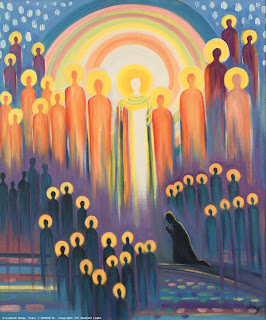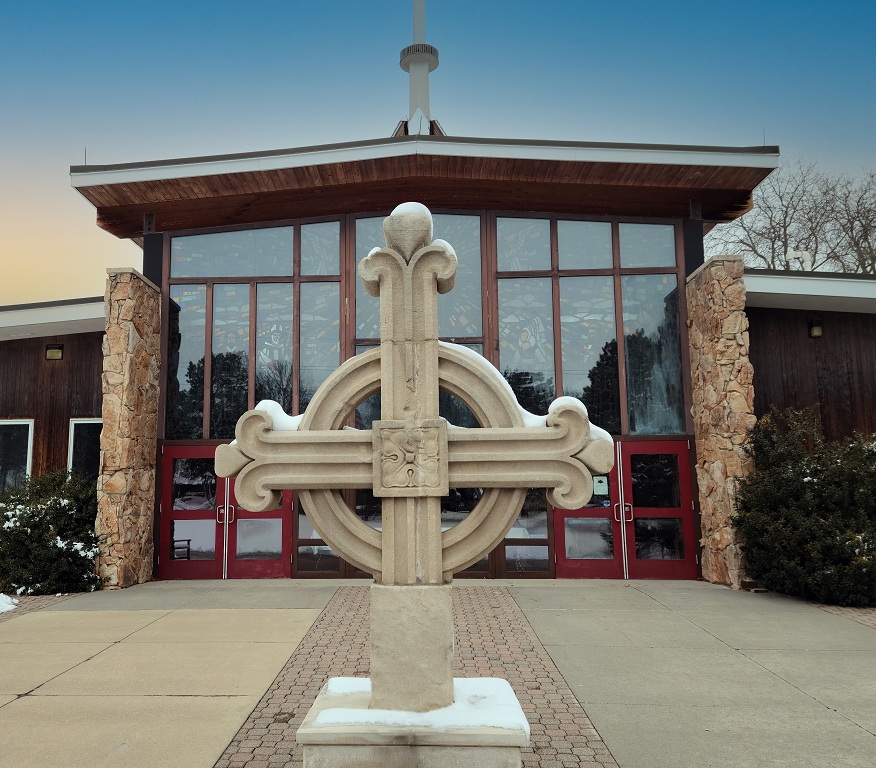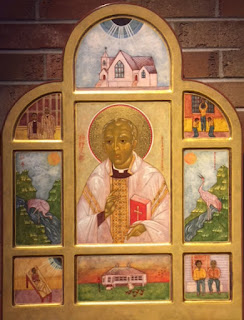I Sing a Song of the Saints of God
Beloved, we are God’s children now. 1 John 3:2a
...
and God’s love made them strong;
and they followed the right, for Jesus’ sake,
the whole of their good lives long.
And one was a soldier, and one was a priest,
and one was slain by a fierce wild beast:
and there’s not any reason, no, not the least,
why I shouldn’t be one too.
They lived not only in ages past;
there are hundreds of thousands still;
the world is bright with the joyous saints
who love to do Jesus’ will.
You can meet them in school, or in lanes, or at sea,
in church, or in trains, or in shops, or at tea;
for the saints of God are just folk like me,
and I mean to be one too.
When I first became an Episcopalian, I had the great blessing to be a member at the church where Canon Fred P. Williams was a priest. Canon Williams was an instrumental part of the creation of the Hymnal 1982; you can see his name listed in the front of it. His knowledge and his passion for music and liturgy was a gift to anyone who knew him. He loved to tell the stories behind the hymns, and he related to us once that this hymn we just sang was omitted from the hymnal: the text seemed too culture-specific, and, obviously being a children’s hymn, it was felt the text was too often trivialized by adults and a source of laughter rather than of praise. By a last-minute action of the Joint Committee for Hymnal Revision of the General Convention of 1982, however, this hymn was restored to the final revision of the official hymnal, and so we could sing it today. The author of the text, Lesbia Scott, wrote a compilation entitled Everyday Hymns for Children—not necessarily for publication, but for use in her own nursery. Most of them were written in response to her children’s requests: “Make us a hymn for a picnic…Make us a hymn for a foggy day…” She wrote this hymn for use on saints days, to impress the fact to her children that sainthood is a living possibility today (Hymnal 1982 Companion Vol. 3, p. 564).
I’m glad this hymn was restored to us—first of all, I think there’s nothing wrong with a little laughter in church. But more importantly, we all know that sometimes a children’s story can hold the most profound truths in its seemingly simple narrative. If we look past the precious quaintness of these lyrics, this hymn gives us a keen biblical understanding of sainthood.
I should pause to give you a spoiler alert—this is not going to be your typical All Saint’s sermon. I’m not going to talk about the great cloud of witnesses that surrounds us, not about all the army of faithful prophets and martyrs and disciples and preachers and scholars who have gone before us. The examples of these holy ones can, and do, inspire and guide us—but that’s going to be a sermon for another year.
You see, with the exception of the apocalyptic writings of Revelation, that mighty, holy band of witnesses is not what the references to “the saints” in the New Testament are about. Nearly all the references we find for “the saints” are from St. Paul, who uses those words repeatedly to address the entire (living) Christian community. At the beginning of Romans we hear St. Paul write: “To all God’s beloved in Rome, who are called to be saints” (Rom. 1:7). In Corinthians: “To the church of God that is in Corinth to those who are sanctified in Christ Jesus, called to be saints” (1 Cor. 1:2). In Ephesians: “To the saints who are in Ephesus and are faithful in Christ Jesus” (Eph. 1:1). In Philippians: “To all the saints in Christ Jesus who are in Philippi, with the bishops and deacons” (Phil. 1:1 NRS). Clearly, Paul’s definition of the word “saint” is “every believer.” Our sequence hymn today provides us with that same teaching.
In the Roman Catholic church, to be made a saint is to be beatified – as in the Beatitudes we heard in today’s Gospel reading – to be made blessed. Jesus, in Matthew 5, is giving us a laundry list of the attributes of saintly living. Folks, these aren’t a few words for an inspirational poster with a picture of a mountain and a sunset we just hang on our wall in the undercroft to make us feel good about ourselves—Jesus words from the Sermon on the Mount are like a letter written directly to us—“To all God’s beloved in Omaha who are faithful in Christ Jesus, who are called saints: You are blessed, you are saintly, when you are humble and poor in spirit and seek God’s will rather than your own. You are saintly when you mourn for all those who suffer while we live in a city and a country and a world full of God’s riches. You are saintly when your hunger and thirst for God’s righteousness leads you to go beyond this compassionate mourning and are moved to effective action. You are saintly when your heart is pure, and when you seek the peace of God that passes all understanding. You are saintly when you risk following Jesus when it is counter-cultural, and people laugh at you and call you naïve or foolish or you even risk harm when you support those whose cries for justice are going unheard.
Human existence is full of things we would rather not face, and we make it easy to ignore Jesus laundry list of what it means to live a saintly life. The great danger in our world today is the seductive call of all our self-centered and self-indulgent distractions. We have fabricated a world in which instant distraction is one touch away on our phones, new “necessities” that would be luxuries even a few years ago are one click away on Amazon Prime, and what passes for compassion is simply a click on a GoFundMe link. I think a good modern definition of what “sainthood” means is being actively aware and present to the holy in our everyday lives, recognizing God constantly at work in our own lives and in the lives of others, seeing that in God’s eyes we are all equally beautiful, all equally desired, all equally loved. The sainted are those who recognize that all of life is woven together into a giant fabric by God’s love, and who are moved to assist in the work to include every single thread in the woof and warp of that tapestry.
Sainthood is not about believing the right set of Christian doctrine; sainthood is about paying attention. When we pay more attention to God than to ourselves, it becomes obvious that the creating God whose Spirit breathed life into the world at creation is sustaining our every breath and bringing the possibility of hope and new life into the world at every moment. It becomes obvious that the demanding God who required care for every stranger in Israel’s midst demands the same from us today. It becomes obvious that the self-giving and loving God who became human in Jesus Christ to preach and teach and heal and invited disciples to join him, invites us to participate in his work of reconciliation today. And it becomes obvious that the forgiving and sacrificing and frail God, who suffered ridicule and torture and death, rose from the grave in triumph to show us that God’s way of love is stronger than any earthly power.
Sainthood is not about the power to dispense God’s grace—no one has power over God’s grace. Sainthood is not about superhuman strength to overcome weakness or to endure suffering. Sainthood is about being aware of how deeply and constantly we are all recipients of God’s grace. Sainthood is about making each breath a prayer of thanksgiving for God’s ever-present Spirit. Sainthood is about making every meal a sacrament of God’s abundant gifts. Sainthood is about being awake at all times to the unquenchable love God has for ourselves and for every single human being. Sainthood is about having the ears to hear the Sermon on the Mount, and becoming “God’s beloved in Omaha who are faithful in Christ Jesus, who are called saints.” My sisters and brothers, God is at work in the world—sainthood is being attentive to that fact and having the faith and hope to participate.
You can meet them in school, or in lanes, or at sea,
in church, or in trains, or in shops, or at tea;
for the saints of God are just folk like me,
and I mean to be one too.
Beloved, we are God’s children now. Amen.
(Image from http://www.radiantlight.org.uk)




Comments
Post a Comment